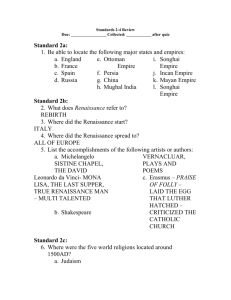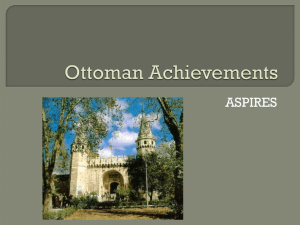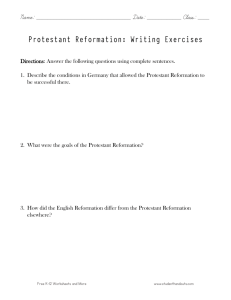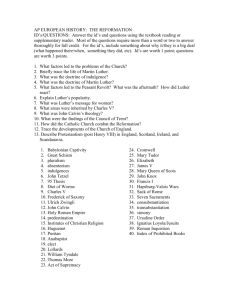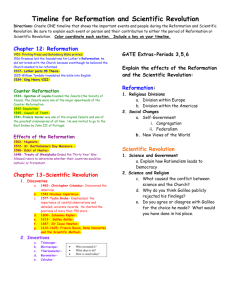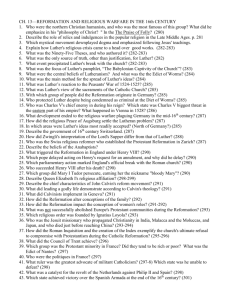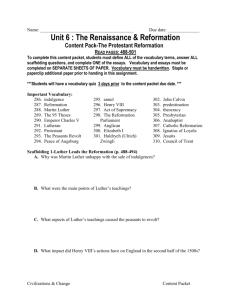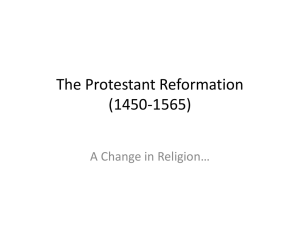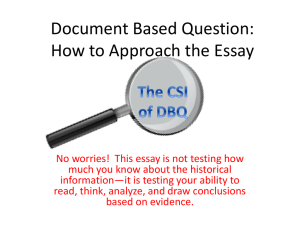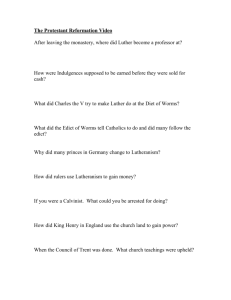Exploration and Colonization - Raleigh Charter High School
advertisement
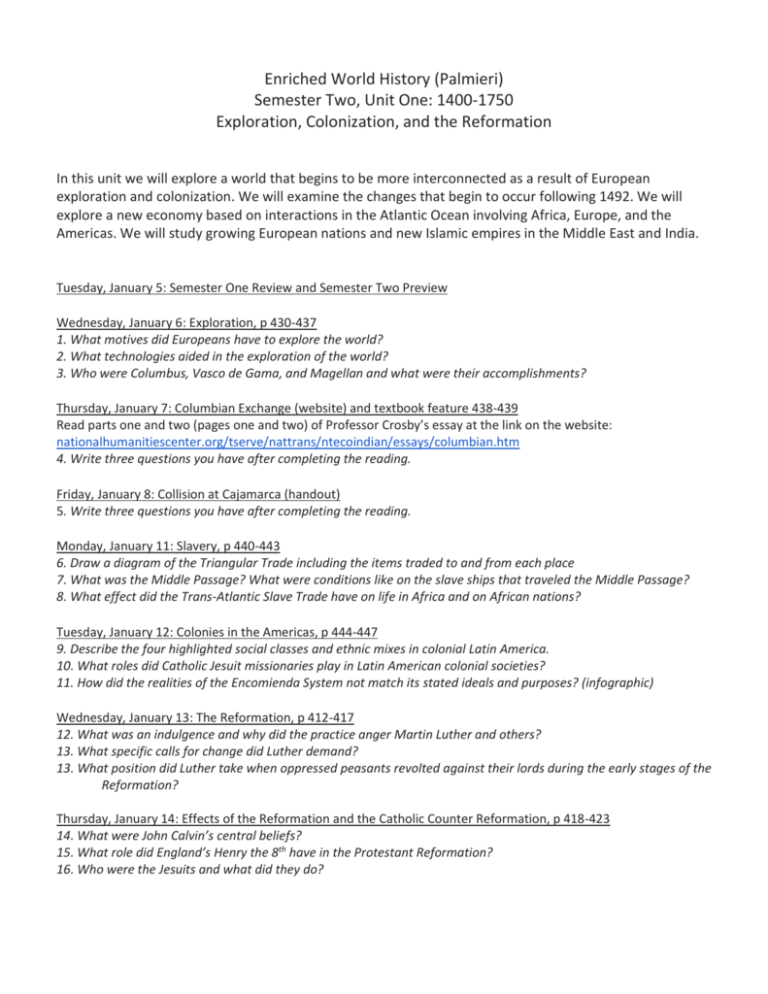
Enriched World History (Palmieri) Semester Two, Unit One: 1400-1750 Exploration, Colonization, and the Reformation In this unit we will explore a world that begins to be more interconnected as a result of European exploration and colonization. We will examine the changes that begin to occur following 1492. We will explore a new economy based on interactions in the Atlantic Ocean involving Africa, Europe, and the Americas. We will study growing European nations and new Islamic empires in the Middle East and India. Tuesday, January 5: Semester One Review and Semester Two Preview Wednesday, January 6: Exploration, p 430-437 1. What motives did Europeans have to explore the world? 2. What technologies aided in the exploration of the world? 3. Who were Columbus, Vasco de Gama, and Magellan and what were their accomplishments? Thursday, January 7: Columbian Exchange (website) and textbook feature 438-439 Read parts one and two (pages one and two) of Professor Crosby’s essay at the link on the website: nationalhumanitiescenter.org/tserve/nattrans/ntecoindian/essays/columbian.htm 4. Write three questions you have after completing the reading. Friday, January 8: Collision at Cajamarca (handout) 5. Write three questions you have after completing the reading. Monday, January 11: Slavery, p 440-443 6. Draw a diagram of the Triangular Trade including the items traded to and from each place 7. What was the Middle Passage? What were conditions like on the slave ships that traveled the Middle Passage? 8. What effect did the Trans-Atlantic Slave Trade have on life in Africa and on African nations? Tuesday, January 12: Colonies in the Americas, p 444-447 9. Describe the four highlighted social classes and ethnic mixes in colonial Latin America. 10. What roles did Catholic Jesuit missionaries play in Latin American colonial societies? 11. How did the realities of the Encomienda System not match its stated ideals and purposes? (infographic) Wednesday, January 13: The Reformation, p 412-417 12. What was an indulgence and why did the practice anger Martin Luther and others? 13. What specific calls for change did Luther demand? 13. What position did Luther take when oppressed peasants revolted against their lords during the early stages of the Reformation? Thursday, January 14: Effects of the Reformation and the Catholic Counter Reformation, p 418-423 14. What were John Calvin’s central beliefs? 15. What role did England’s Henry the 8th have in the Protestant Reformation? 16. Who were the Jesuits and what did they do? Friday, January 15: England, p 454-456 and 461-463 17. What were the goals of the Spanish Armada? What happened to it? 18. What causes, both political and religious, were there for civil war in England? 19. What limits to the monarchy's power were established with the English Bill of Rights in1689? Monday, January 18: NO SCHOOL, MARTIN LUTHER KING JR. DAY Tuesday, January 19: France, p 464-466 and 470-471 20. Imagine you are of King Louis the 14th's officials and describe life at Versailles through a one-page diary entry. Wednesday, January 20: The Russian Empire, p 467-469 21. Make a chart listing three characteristics of Prussia and three characteristics of Austria. 22. How did Peter the Great try to change Russian culture? 23. What political and military goals did Peter the Great have? Thursday, January 21: Islamic Empires: Ottomans (Turkey) p 484-491 24. Describe where the Ottoman Empire expanded (include all geographic areas). 25. Why were the Ottomans along with the Safavids in Iran and Moguls in India called "gunpowder empires"? 26. What was profound and characteristic about Ottoman architecture as well as art? Friday, January 22: Islamic Empires: Safavids (Iran) and Moguls (India) p 492-495 and 498-502 27. What similarities and what differences did the Safavids have to the Ottomans? 28. What unique religious and cultural ideas did Akbar have? 29. Under Mogul rule, what was the religion of the ruling classes? What was the religion of the majority of Indians? Monday, January 25: Unit One Review Tuesday, January 26: UNIT ONE TEST Review Ideas for Unit One: A B C D E F G H How did European powers such as Spain, Portugal, France, and England differ from land based empires such as Russia, the Ottomans, Safavids, and Moguls? What similarities existed? What advantages did European powers have over peoples they encountered in the Americas? What effects did the Reformation have on Europe and on the world? In what ways was the world different after 1492? What characterized the societies that emerged in areas of the Americas colonized by Europeans? What economic and social effects did the Trans-Atlantic Slave Trade have? What role did religion play in shaping the societies encountered in this unit?

